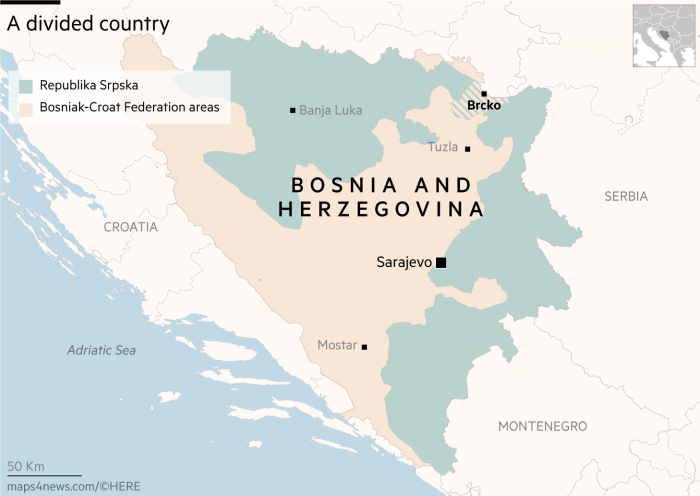
Bosnian Serb leader Dodik defiant over sanctions as tensions flare
US sanctions imposed on Milorad Dodik last week have underlined the shifting opinion about the Bosnian Serb leader in western capitals — and the resurgent threat of ethnic tension in the Balkans.
Dodik was first elected as Bosnian Serb leader more than two decades ago, in the wake of peace accords that ended Europe’s deadliest conflict since the second world war. He was viewed in the west as a figure capable of helping Bosnia — split between a Serb-controlled entity and another dominated by Croats and Bosniaks — move beyond its sectarianism.
But the increasingly nationalist politician has portrayed the 1995 Dayton peace accords as a vehicle of western interests. He has boycotted Bosnia’s institutions since July and wants to end Bosnian Serb co-operation on matters such as defence, tax and judicial affairs. The prospect of what in effect would be a quasi-secession has sparked international warnings of the risk of renewed ethnic violence.
Last week, Washington moved to freeze assets linked to Dodik in the US for alleged “destabilising and corrupt activities” jeopardising the Bosnian peace process. This week, the EU threatened to follow suit with its own punitive measures, condemning “inflammatory rhetoric” at controversial celebrations held in Bosnia’s Serb-dominated region on January 9.

Dodik, who has drawn closer to rulers including Vladimir Putin, Russia’s president, has responded with defiance.
“If they think they will discipline me they are hugely mistaken,” he told state television RTRS after the US sanctions. “I even have a new motive to fight for the rights that are being wrestled from us for 26 years.”
The Dayton agreement split Bosnia into the autonomous Serb Republic and the Federation, dominated by Croats and Bosniaks, with the two linked by a weak central government. Serbs make up about 1.3m of Bosnia’s 3.3m people. International oversight has prevented violence for decades, but over time the construct has hardened ethnic divisions that are being exploited by leaders such as Dodik, analysts say.
Dodik’s threats also came after Valentin Inzko, Bosnia’s international High Representative, imposed a genocide denial ban in July, just before leaving office. The High Representative’s office was created in the Dayton accords to help maintain peace and develop democratic institutions.

Haris Silajdzic, former Bosnian prime minister and president, who helped to broker the accords, believes that Dodik wants the Serb Republic to wrest public lands and property from the control of the national government.
“They want . . . to get the resources of Bosnia and Herzegovina,” said Silajdzic. He and other politicians and analysts said this would in effect mean control for Dodik.
Valery Perry, a senior associate of the Sarajevo-based Democratisation Policy Council, said there was a serious risk of corruption. “It is troubling that the international community have not pushed back against this more,” she said.
Dodik did not respond to requests for comment.
Majda Ruge, senior fellow at the European Council on Foreign Relations, called Dodik’s secession move a “desperate escalation”, adding that the separation of taxation alone would cost the Serb Republic an annual $360m in lost budget revenues, compared with gross domestic product of $7bn.
Elections are due in Bosnia in October. The opposition in the Serb Republic says its gains are encouraging Dodik to fight on issues such as identity.
“Dodik is a good bluffer,” said Branislav Borenovic, chair of the opposition PDP party. “He is trying to keep a crisis on the agenda. That’s the only way for him to stay in power. He has no real answers to the economy challenges, the pandemic, corruption, emigration, rule of law challenges.”
Borenovic also said the genocide denial ban had helped Dodik. “When Inzko imposed this law, he gave [Dodik’s party] new fuel, a crisis — and they will use it as long as they can, until the elections if possible,” he said.
Inzko said he had sought to do the right thing, calling Dodik “a man without character” who “tries to destroy Bosnia and Herzegovina”.
Dodik, Inzko said, “was pro-west, now he is ridiculing the west. He once said [wartime Bosnian Serb leader and convicted war criminal Radovan] Karadzic was a war criminal and had to be delivered to The Hague, now he is glorifying him”.
Dodik’s threats of secession come as the west is battling for influence in the Balkans with Russia and China. Since 2006, Dodik has strengthened relations with Putin, whose main strategic goal in the region is to block further expansion of the EU and Nato. Dodik visited the Russian leader in December and said Putin had assured his support against the “liberal west”.

However, Aleksandar Vucic, Serbia’s president, has distanced himself from Dodik even though his own Serbian nationalism has drawn criticism from the west.
“The international community made thousands of mistakes in Bosnia,” Vucic told the Financial Times in a recent interview in Belgrade. “Taking competencies and authorities out of the Serb Republic, not listening to the people . . . But you have to be 100 per cent strict in obeying the Dayton peace accord and the Bosnian constitution.”
Sources in Bosnia and western diplomats say that while the US moves may herald tougher sanctions, the west is also keeping the door open to talks with the Bosnian Serb leader. “That is one of the reasons why we have not been as escalatory as people want us to be,” a senior US state department official said.
The ECFR’s Ruge said she was optimistic that a unified western response might force Dodik to change course on secession. “It can be prevented,” she said, “if all important western capitals get on the same page.”
Stay connected with us on social media platform for instant update click here to join our Twitter, & Facebook
We are now on Telegram. Click here to join our channel (@TechiUpdate) and stay updated with the latest Technology headlines.
For all the latest Education News Click Here
For the latest news and updates, follow us on Google News.

